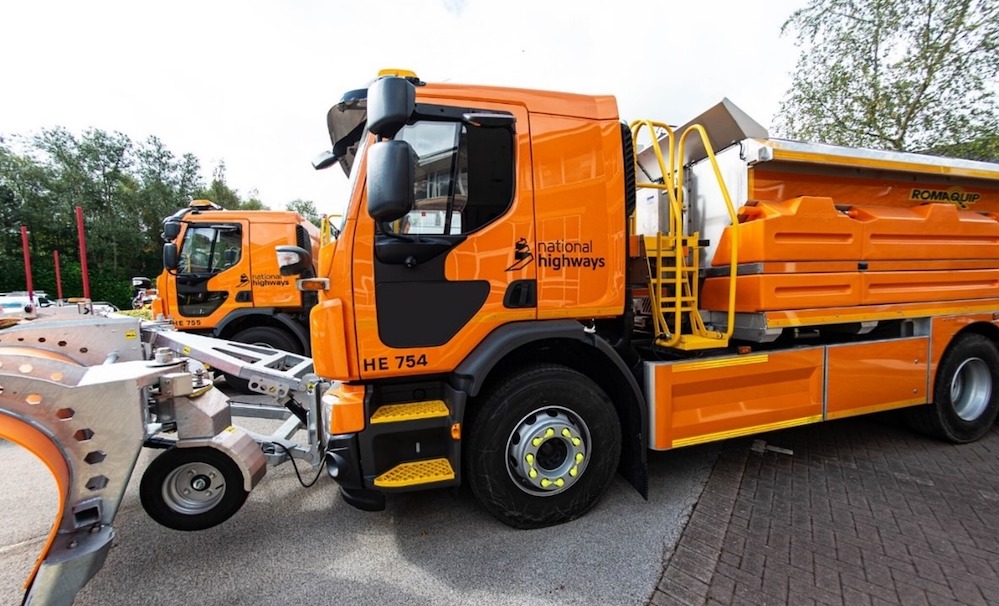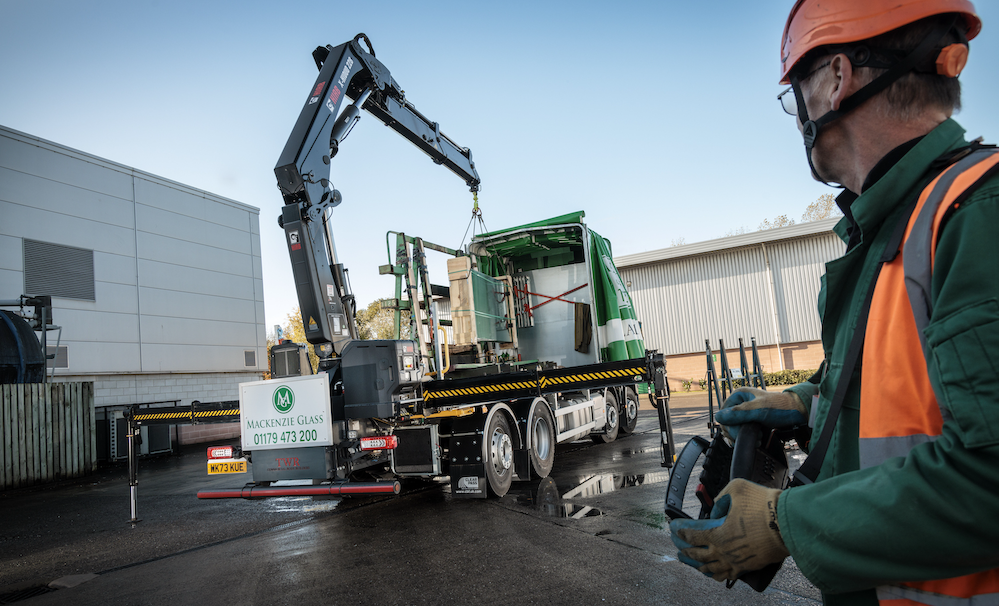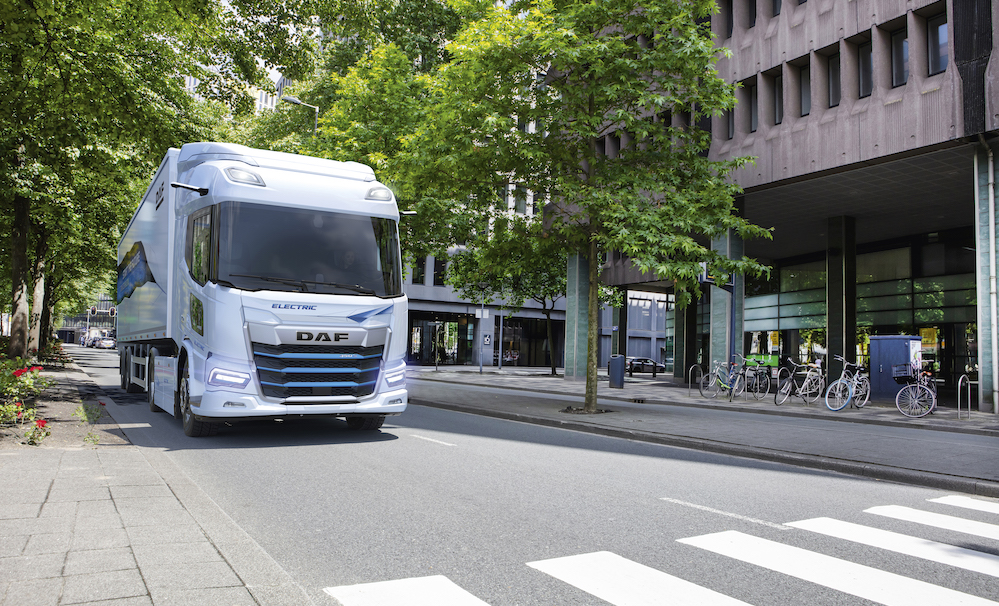An entire set of 252 state-of-the-art gritting vehicles has now been assembled at National Highways and will be operating on motorways and A-roads in England this autumn and winter.
The announcement marks the culmination of a two-year National Highways investment project worth £44m with partners including Romaquip to bring the new Volvo vehicles to the national network. Around 144 were introduced last winter with the final batch of the remaining 108 vehicles joining them at depots up and down the country by the end of October.
Together with the 252 new gritters added over the last two years, National Highways now an overall pool of more than 530 gritter vehicles ready to deploy across the network in sub-zero temperatures if needed, which includes 443 Volvo Romaquip gritting vehicles, all of which have been introduced since the start of the winter 2018 season.
Meanwhile in Yorkshire, Malton on the A64 and Newport on the A63 become the latest salt depots to open for operations this season, with a total of 128 depots now being used by our gritting teams across the National Highways network.
Our autumn and winter teams have a total stockpile of around 280,000 tonnes of salt across the network for the coming months, with salt mountains at 128 depots.
National Highways sought the most advanced technological innovations to upgrade its gritter fleet when it issued a Prior Information Notice outlining its vehicle specification – and Romaquip was one such company to embrace the challenge and secured the contract in the resulting procurement process.
It now means our fleet of gritters (cockpit of one of the gritters pictured) have the following features:
- Enhanced performance: The Romaquip gritters can travel at a maximum speed of 50mph when salt spreading – ten miles an hour faster than earlier vehicles – helping to keep traffic moving on the roads during periods of salt spreading.
- Eco-friendly: They are the cleanest and most efficient diesel heavy goods vehicles available in the UK, meeting Euro 6 requirements – the latest EU emission standards for heavy-duty CI (diesel) engines to reduce harmful exhaust emissions.
- Smart technology: On-board functions allow salting routes to be uploaded directly into the vehicle cockpit, assisting drivers with the latest information on where and when to salt.
- Precision spreading: Latest tech advances enable drivers to choose the most appropriate treatment in different road conditions.
Andy Butterfield, Customer Service Director for Operations, at National Highways, said:
“We are delighted the rollout of our new state-of-the-art gritting vehicles is complete, with every machine in position and ready for the winter season ahead to help keep our road users safer on the roads, whatever weather conditions we face.
The first of these gritters in this £44m two-year investment programme began operating on our roads last year and work has continued over recent months to complete the full set.
It is testament to the work of our staff and partners to deliver this project ahead of schedule. It was initially going to take three years for the rollout to be completed. It demonstrates excellent collaboration, hard work and a committed and determined focus to deliver every vehicle in time for the 2022 winter period.
National Highways always strives to explore and embrace innovation to benefit our road users. These vehicles are environmentally friendly, have cutting-edge technological features and can be driven at a higher speed than older models.
We now have a total of around 530 vehicles ready to be deployed and all of them will play their part in helping our autumn and winter operations team, including our drivers, to carry out their vital work over the next few months to treat the road surfaces whenever and wherever it is needed.”
Stephen McKeown, Managing Director at Romaquip said:
“Romaquip are very proud to deliver this project on time, and especially through all the challenges of a global pandemic. The National Fleet Team at National Highways, headed by Martin Edgecox, has been a pleasure to work with and together we have successfully developed numerous innovations in safety, environment, and operations. Realising these innovations in such a large fleet will result in significant measurable enhancement in winter service in the UK.”
Where are the new gritters based?
Regions who received new gritters in 2021/22 (144 in total) were:
- East region: Bedfordshire, Hertfordshire and parts of Suffolk and Cambridgeshire – 28 vehicles
- East Midlands region: Leicestershire, Northamptonshire, Derbyshire, Nottinghamshire, Lincolnshire, part of Warwickshire, Rutland and part of Oxfordshire – 47 vehicles
- South East region: Kent, Surrey, West and East Sussex – 36 vehicles, (South East)
- South West region: Cornwall, Devon, Somerset, Bristol, Wiltshire and Gloucestershire – 2 vehicles
- West Midlands region: West Midlands, Shropshire, Worcestershire, Herefordshire, Warwickshire, Staffordshire and part of North Gloucestershire – 13 vehicles
- Yorkshire and Humberside region: – 18 vehicles
Regions receiving new gritters in 2022/23 (108 in total) are:
- North West region: Merseyside, Cheshire, Greater Manchester and the Wirral – five vehicles
- South West region: South West – Cornwall, Devon, Somerset, Bristol, Wiltshire and Gloucestershire: 37 vehicles
- West Midlands region: Shropshire, Worcestershire, Herefordshire, Warwickshire, Staffordshire and part of North Gloucestershire – 47 vehicles
- Yorkshire and Humberside region: Yorkshire and Humberside: 19 vehicles
Autumn and winter can bring more adverse and severe weather conditions which can affect motorists and these include fog, heavy rain, high winds and gales and ice and snow.
Along with more than 250 weather stations, that provide us with real time information about localised road conditions, National Highways works with independent meteorological experts DTN and Metdesk which run from October 1 to April 30 and complement the national Met Office weather forecast, providing a level of granularity and precision about changing road surface temperatures across our road network. This gives us the detailed knowledge determine where and when to salt roads so they remain open and safe for people to use.
All of the information we gather helps us to inform road users about current road conditions whatever the weather. We also share information through channels including our website, third party travel providers including sat nav companies and local radio stations.
Abigail Oakes, Senior Account Manager at the Met Office, said:
“We are delighted to continue our close working relationship with National Highways this autumn and winter season.
Our staff, be that meteorologists embedded alongside the National Highways team in Birmingham during the autumn and winter, or Met Office staff working from Exeter to deliver and support throughout the year, are proud to continue this partnership, which allows for the best possible support for road users during periods of severe weather.”
We have invested £44m over two years replacing 252 gritters. National Highways now has around 530 gritting vehicles which can be out on our roads in sub-zero temperatures helping us to maintain our network and enhance our service to customers. This equates to one gritter for every eight miles of road. The 530 gritters includes 443 Volvo Romaquip gritting vehicles – all of which have been introduced through the replacement programme that started in 2018.
These vehicles are based at 128 depots nationwide with a stockpile of around 280,000 tonnes of salt for the autumn and winter season. There are two new depots in this total – one at Malton, on the A64 and one at Newport on the A63, both in Yorkshire.
Explore more online:
National Highways has lots of advice on its website around travelling in severe weather conditions, including high winds and gales, fog, rain and snow and ice. Visit our travelling in severe weather web page.
Weather forecasts and information can be found on the Met Office website here.
Travel information can be found by visiting National Highways’ Travel updates page, and by following @highwaysnwest @highwaysneast @highwaysseast @highwaysswest @highwayseast @highwayswmids, @highwaysemids @highwaysyorks on Twitter or calling the National Highways Information Line on 0300 123 5000.







